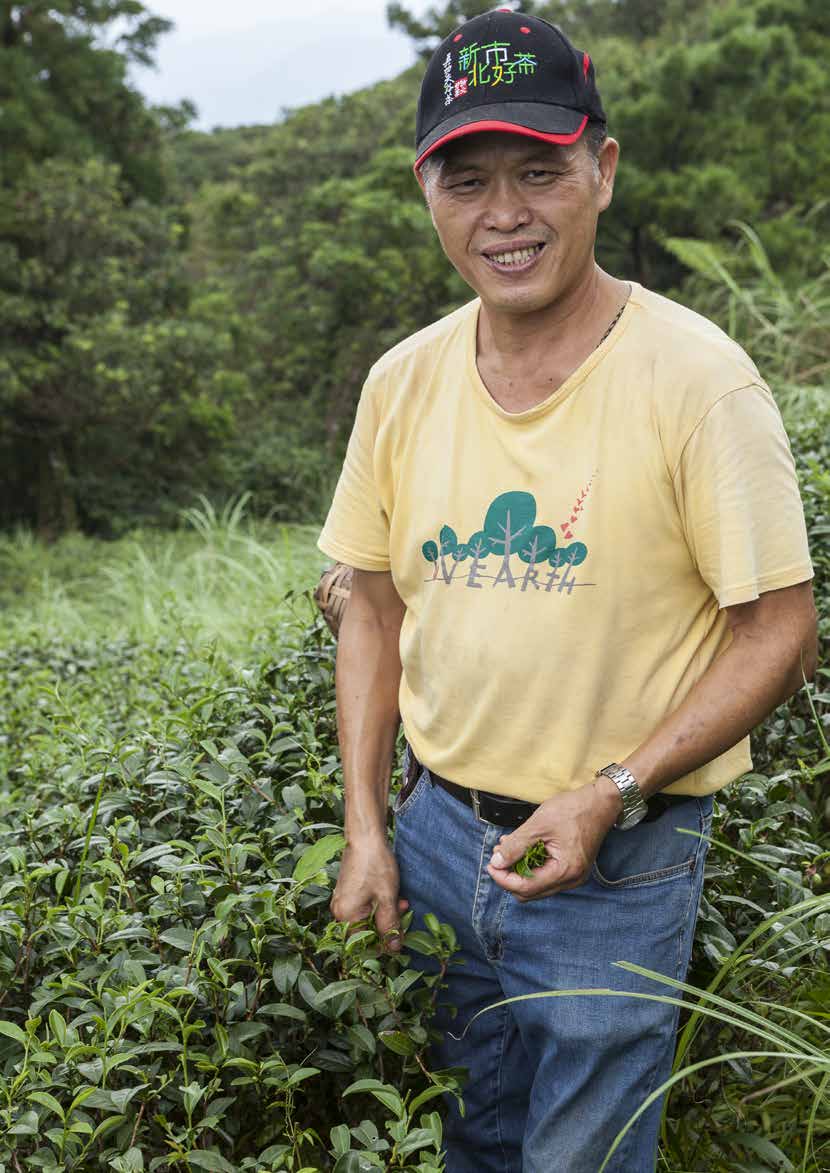
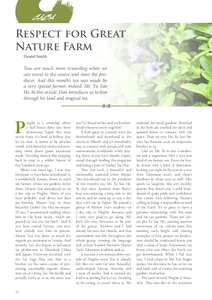 |
|
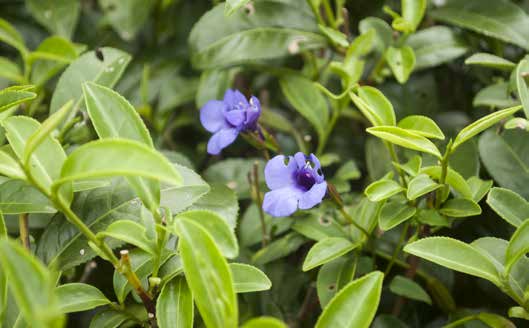
Pinglin is a township about a half hour's drive east from downtown Taipei. But once you're there, it's hard to believe that it's so close. It seems to be another world, with beautiful rivers and stunning views down green mountain roads. Traveling there is like stepping back in time to a wilder Taiwan of five hundred years ago.
About two years ago, I was very fortunate to have been introduced to a wonderfully honest, down to earth tea farmer, whose tea gardens thrive there. Master Tsai introduced us on a day trip to Pinglin. Many of you have probably read about our dear tea brother, Master Tsai, in these beautiful Global Tea Hut envelopes. (If not, I recommend reading about him in the back issues, which are posted on our site for free!) And if you have visited Taiwan, you may have already met him in person. Master Tsai has done so much for organic tea awareness in Taiwan. And recently, he's also begun to influence tea production in Mainland China and Japan. Everyone involved with the Tea Sage Hut sees him as a brother on the same course of promoting sustainable organic plantation tea or Living Tea. He kindly and proudly looks at us in the same way too! It's broad smiles and tea brotherhood whenever we're together!
It feels great to connect with the brotherhood and sisterhood at the center in Miaoli, and it's remarkably easy to connect with people and their communities worldwide while staying there, as you have already experienced through reading this magazine and being a part of Global Tea Hut.
That was such a beautiful and memorable weekend when Master Tsai introduced me to the producer of this month's tea, Mr. Yu San He. At that time, Antonio from Barcelona was enjoying a long visit to the center, and he came up to stay a few days with me in Taipei. We joined a group of Master Tsai's students on a day trip to Pinglin. Antonio and I were very glad to go along. We both felt very fortunate to be part of the group. Antonio and I had already become fast friends, and that camaraderie was felt throughout the whole group, crossing the language and culture barriers between Master Tsai's Taiwanese students and us.
It was just a ten-minute drive outside of Pinglin town, but it already felt like we were far into beautiful, undeveloped Taiwan. Antonio and I were all smiles. And it seemed the land was smiling back at us, thanking us for caring so much about it. We explored the small gardens, breathed in the fresh air, smelled the earth and quieted down to connect with the space. Then we met Mr. Yu San He, who has become such an important brother to us.
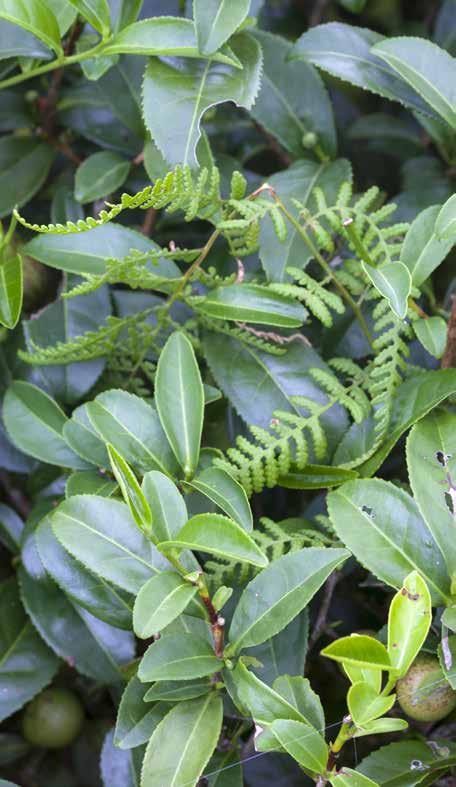
Like us, Mr. Yu is also a meditator and a vegetarian. He's a very rare kind of tea farmer, too. From the first, he shines with a kind of directness, looking you right in the eyes in a way shier Taiwanese won't, and there's kindness in those eyes as well. He's quick to laughter, like any healthy person, but there's also a solid foundation of quiet pride and confidence that comes with following Nature's calling in being a responsible steward of the Earth. It's so great to have a genuine relationship with this man and his tea gardens. There are others like Yu San He, creating another movement of tea culture here, but meeting such bright and shining examples of how proper tea production should be conducted leaves you with a sense of hope. Sometimes, tea lovers who care about the Earth can get downhearted. When I feel that way, I find solace in Mr. Yu's bright smiles, the devotion he has to his tea and land, and of course the stunning gardens themselves.
The land around Pinglin is beautiful. This area lies in the northern foothills of the high-altitude Xue Ba Mountains of northern Taiwan. It's a mountainous area with no highways or train routes that stretches southeast to Yilan and Hualian, and Hsinchu and Miaoli counties to the southwest. Rivers roll down through the area on their way to the ocean; and they're still charged with the high mountain energy. Most rivers in Taiwan are dammed and hardly recognizable, but here, they're still teeming with life. You also quickly realize just how much tea is grown in this area. There are tea gardens of various sizes around every corner. The small winding roads reveal one after another at almost every turn. If you take a walk through Pinglin town, you are sure to see many shops, with a few grandmas and aunties sorting through tea leaves - discarding the more mature ones and pulling off the larger stems.
"Baozhong, (包種)" tea is by far the most common type of tea produced here. Though the name 'Wenshan Baozhong' is famous locally and internationally, most Baozhong tea comes from Pinglin and Shiding. 'Wenshan' is the name of the district which also contains Muzha (famous for Tieguanyin) and it's right next door to Pinglin, Shiding and Taipei City.
Baozhong oolong is a Northern Taiwanese tea that dates back to the Qing Dynasty. The name "Baozhong" refers to the traditional paper packaging of the tea leaves that was used in sale and export. It also represents a well-known name for this regional tea. There is no true Baozhong tea from anywhere other than Northern Taiwan. There could be some people that make or sell tea from another part of Taiwan and call it "Baozhong Style", but I think locals probably feel that there's something wrong in doing so. It is characterized by a light withering (oxidization) that produces pronounced yet pleasant, natural floral, cool and vegetal fragrances and flavors. Though it was more oxidized in the past, the modern day processing style could be described as the greenest of the oolongs - falling somewhere between green and oolong tea. Though traditional Baozhong was most always more heavily oxidized and roasted, there may have been some very green batches in the early days too, as it has been described as a "qing cha, (青茶)" or "blue-green tea", since the Qing Dynasty.
Pinglin and its tradition of Baozhong production have influenced Yu San He. He very much sees a heritage in these traditions. The greatest portion of the tea he makes is Baozhong and his long experience of making it enhances all the red, green, Bai Hao Oolong (Oriental Beauty) and GABA tea he makes. He is very connected with his tea and the land in Pinglin, Northern Taiwan. His tea fields are just a few kilometers away from the largest natural water reservoir serving Taipei.
Mr. Yu has been growing organically for over ten years, but the vast majority of the tea gardens in the area haven't been. Great amounts of pesticides and chemical fertilizers are sprayed there, in detriment to the ecosystem and the future of tea production in the region. He decided long ago to stop being a part of this problem, and has since become a bright example of someone who can produce fine tea without polluting the environment. He's also become rather well known nowadays, with several magazine and newspaper articles covering the positive impact he's having on the region.
Mr. Yu proudly refers to his tea farm as "Respect for Great Nature Farm". After getting to know him and this amazing farm, which is indeed filled with a reverence for Nature, I broached the subject of donating to Global Tea Hut and his eyes lit up - smiling on their own just moments before his mouth followed. A few weeks later, Wu De, along with all the residents and guests at Tea Sage Hut, came up to meet Mr. Yu. As usual, he served us a delicious meal of organic vegetables from his garden just outside his centuries-old traditional Taiwanese courtyard home. We drank tea through a pleasant afternoon, smiling and laughing like old friends. Mr. Yu was so happy to see the previous issues of this magazine, and proud that so many people around the world would share his tea. He said he felt supported by the fact that so many people believe in what he's doing!
We took a drive up to see the gardens this month's tea comes from. Mr. Yu is always happy to share info of how the weeds, vegetables, insects and worms of the natural ecosystem are enriching the land. And, of course, he and Wu De hit it off and spent hours talking together about Tea.
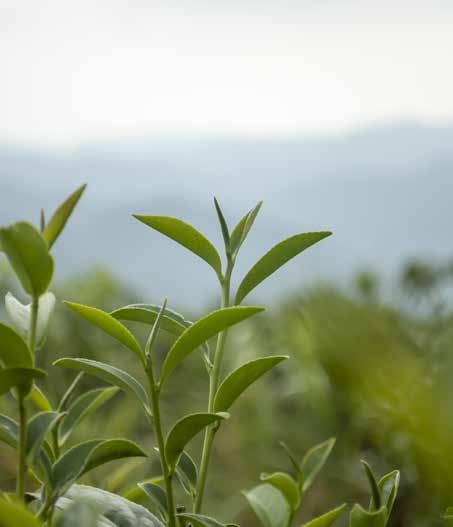
One noteworthy factor about his growing methods is that he doesn't use any organic fertilizer or irrigation. This is one of the characteristics of Living Tea, referred to as "ziran nongfa, (自然農法)" in Chinese (literally, "natural agriculture method"). It's based on a philosophy of letting the tea bushes struggle on their own, helping them as little as possible, and letting the weeds grow up around them. This encourages the trees to weave themselves into the local ecosystem, without any foreign agents, and grow stronger through it. I like to refer to such farming as "beyond just organic". It is much closer to Living Tea - full of vibrancy and harmony. I've been living in Taiwan for about five years now, and his teas are a few big, solid steps above any other organic teas I've experienced here.
As many of you know, we need some tea produced at higher yields so that everyone can have tea. That means compromise. Organic plantation tea serves a very important function, producing larger quantities of tea so that everyone can share in this medicine. Not all tea can be Living Tea, in other words. But it is also nice to see the emergence of this middle ground, which we call "ecological gardens": tea that is constrained and compromised in some ways, but less so than most plantation tea, including organic ones.
Mr. Yu's bright spirit shines through his land and tea. It is a beautiful demonstration of how tea is a merging of Heaven, Earth and Man. Walking through his gardens, you can feel the influence that the farmer has on the land he stewards. Tea is a conversation between Man and Nature, and this month's tea is a beautiful discussion about gratitude and love. I hope you feel Mr. Yu's spirit in this tea, and through it connect to some of the vibrancy and natural power of Taiwan's rolling northern hills...

